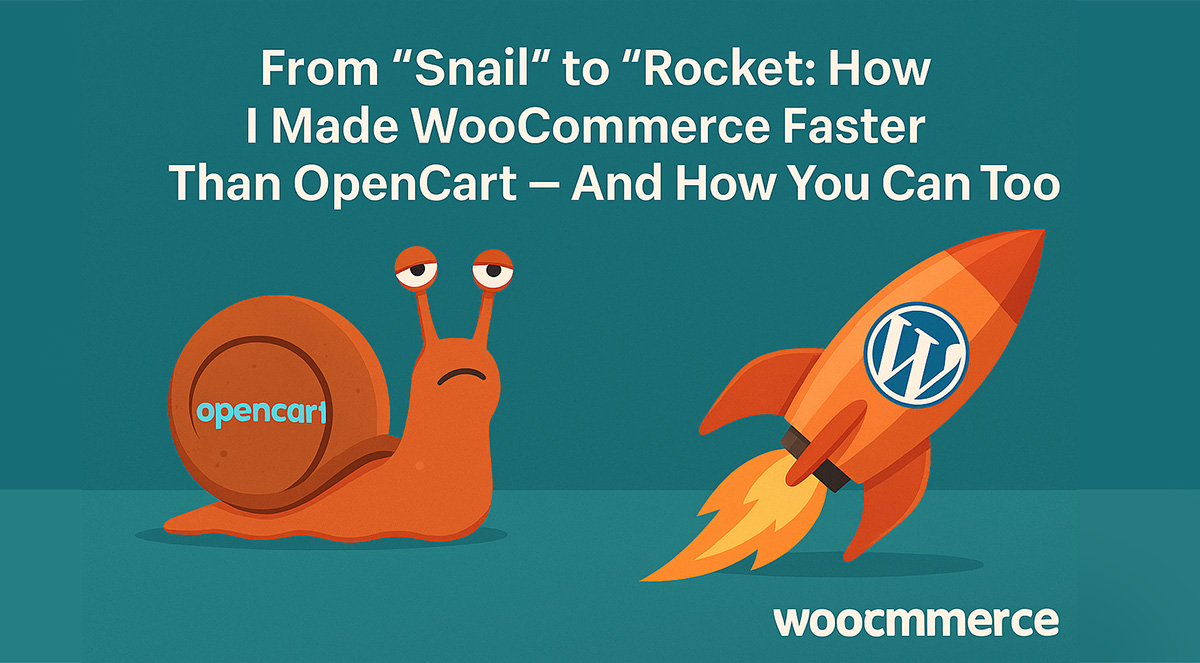From “Snail” to “Rocket”: How I Made WooCommerce Faster Than OpenCart — And How You Can Too

When I First Started With E-Commerce
When I first started working with e-commerce, WordPress and WooCommerce seemed like the perfect combination: an intuitive interface, plugins for every imaginable need, and robust SEO capabilities. Everything felt great, but one persistent problem bugged me and held back progress: speed.
WordPress: Convenient, but Slow? A Myth That Cost Me Money
I constantly heard:
“WooCommerce is slow”, “OpenCart flies”, “better use Shopify than this sluggish thing.”
And honestly, I saw it too.
Sometimes pages took several seconds to load, and caching didn’t help. All my work in SEO and design was being undone by loading times that scared away potential customers.
OpenCart: Fast, But…
I launched several stores using OpenCart. And yes — it really was fast: minimal queries, lightweight structure, and “out of the box” speed.
But then came the problems:
SEO? Poor by default.
URLs? Often messy.
Meta tags? Required manual setup or clunky third-party tools.
Design? Very limited flexibility — adding a blog or custom homepage banners was frustrating.
The Real Culprit: AJAX, Not WooCommerce
And only now did I realize the main thing:
It wasn’t WooCommerce that was slow — it was AJAX.
Most popular WooCommerce themes (WoodMart, Porto, Flatsome, etc.) use AJAX for:
Product filters
Sorting
Pagination
That means those elements load separately and are not cached. Google doesn’t see them. LiteSpeed Cache or WP Rocket can’t optimize them. So:
Search engines miss out on valuable pages
Users face longer loading times
Your store becomes both invisible and sluggish
The Breakthrough: Disabling AJAX Changed Everything
Once I disabled AJAX:
Filters and paginations became SEO-friendly URLs (like
/shop/tshirts/men/)All product variations became indexable, boosting visibility
TTFB dropped from 600ms to an astonishing 50ms
20,000+ products load instantly, even with advanced filters
How to Achieve OpenCart Speed on WooCommerce
Here’s exactly what I did:
1. Disable AJAX Filters
Use your theme settings or tools like JetSmartFilters or Filter Everything.
2. Use LiteSpeed Cache
Especially powerful when combined with QUIC.Cloud or Cloudflare CDN.
3. Clean Your Database
Regularly remove post revisions, WC sessions, transients, and unused postmeta.
4. Disable WooCommerce AJAX Requests
Use optimization plugins or small code snippets to remove cart fragments and similar AJAX calls.
5. Make Filters SEO-Friendly
Ensure every filter option creates a static, indexable URL.
✅ Conclusion: WooCommerce Speed Is Not a Myth
I used to believe only OpenCart could be fast. I was wrong.
With proper setup, WooCommerce offers the best of both worlds:
Outstanding SEO
Flexible design
Blazing speed
You just need to remove the real bottleneck — AJAX filters.
Try it yourself — and watch your store fly.
Want Your WooCommerce Store to “Take Off”?
I can help you do the same.
Request a free site audit, and I’ll show you real performance improvements — not just PageSpeed numbers.
